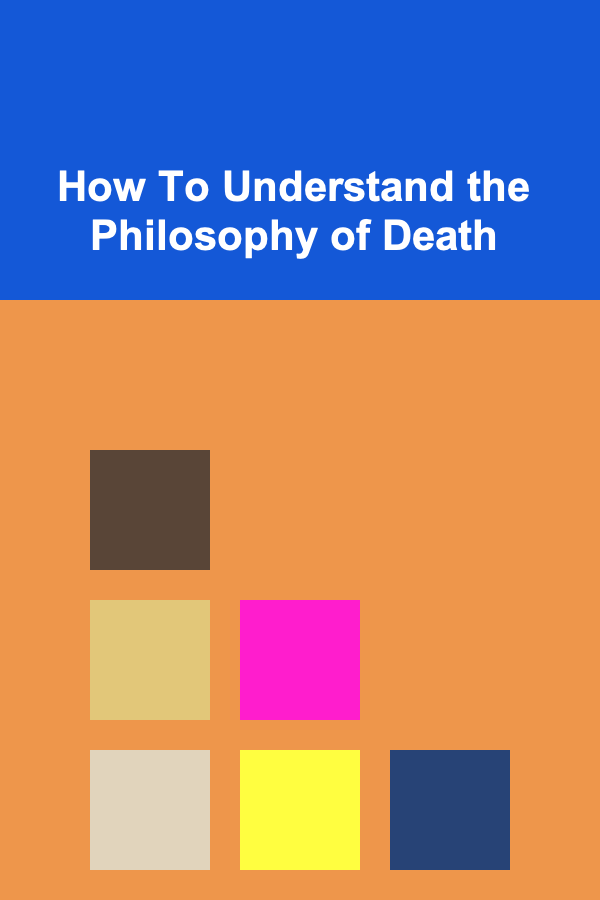
How To Understand the Philosophy of Death
ebook include PDF & Audio bundle (Micro Guide)
$12.99$11.99
Limited Time Offer! Order within the next:

Death, the inevitable end of life, has perplexed and intrigued humanity throughout history. It is a subject that raises deep existential questions, prompting contemplation about the meaning of life, the nature of existence, and what comes after. Philosophers, religious figures, and scholars have long debated the nature of death, each offering a unique perspective based on cultural, spiritual, and intellectual beliefs.
In this article, we will explore the philosophy of death by examining different perspectives on mortality, the implications of death on life, the concept of the afterlife, and how death influences our understanding of living. By delving into these ideas, we aim to provide a comprehensive understanding of how the philosophy of death shapes human thought and behavior.
The Human Understanding of Death
At the heart of the philosophy of death is the question: What does it mean to die? While death is a biological event, the human perception of it is layered with cultural, psychological, and philosophical dimensions. People experience death not just as the cessation of bodily functions but as a profound existential experience that involves questions of identity, legacy, and the unknown.
Mortality and the Fear of Death
One of the key philosophical issues surrounding death is the fear of mortality. This fear, often referred to as thanatophobia, is a natural response to the awareness of one's finite existence. Throughout history, death has been a source of anxiety and uncertainty. The realization that death is inevitable often prompts existential questions such as: What is the purpose of life? What happens after death? And how should one live, knowing that life is finite?
Philosophers like Epicurus and Michel de Montaigne addressed the fear of death by asserting that death itself should not be feared. Epicurus famously stated, "Death is nothing to us, for when we are, death is not, and when death is, we are not." According to Epicurus, death is the end of consciousness, and therefore, it holds no subjective experience for the individual. There is no pain, no fear, no suffering, only non-existence. Montaigne echoed similar sentiments, suggesting that death is a natural and inevitable part of life, one that should be accepted rather than feared.
The Concept of the Soul and Afterlife
Many philosophical and religious traditions have proposed the existence of the soul, the immaterial essence of a person that transcends death. For instance, in Plato's dialogues, the philosopher presents the idea that the soul is immortal and continues to exist after the body dies. The soul, according to Plato, is the true essence of a person, and it is only the body that perishes. This idea laid the foundation for many religious views on the afterlife, where the soul is judged and sent to either a state of eternal bliss or suffering.
In contrast to Plato's view, Aristotle had a more grounded approach to death. For Aristotle, the soul was not separate from the body but rather the form of the body. Upon death, the soul ceases to exist, as it is inseparable from the living organism. This perspective is more aligned with materialism, which asserts that the mind and consciousness are products of physical processes in the brain. When the body dies, consciousness ceases to exist.
Religions across the world, including Christianity, Islam, Hinduism, and Buddhism, offer varying views of the afterlife. These religions propose that the soul lives on after death and is either rewarded or punished based on the individual's actions during their lifetime. Christianity, for instance, teaches that the soul ascends to heaven or descends to hell based on one's faith and deeds. Similarly, Hinduism and Buddhism introduce the idea of reincarnation, where the soul is reborn in another body, potentially learning lessons from previous lives.
The Fear of the Unknown
Another aspect of the philosophy of death is the fear of the unknown. While many cultures have developed beliefs and narratives about what happens after death, no one can definitively answer this question. The mystery of the afterlife---or the possibility of non-existence after death---leaves many people uncertain and anxious. This uncertainty has led to numerous philosophical and religious speculations about the nature of death.
In existentialism , thinkers like Jean-Paul Sartre and Martin Heidegger grapple with the human experience of death in a world where the afterlife is not guaranteed. Heidegger, in particular, emphasized that death is a defining feature of human existence. For Heidegger, understanding death is essential for understanding life. He coined the term "Being-toward-death," which refers to the individual's awareness of their inevitable mortality. This awareness, according to Heidegger, shapes how we live, encouraging us to make authentic choices and live more fully.
Existentialists view death as a boundary, a limit that defines human existence. Death makes life finite and precious, which can either lead to despair or motivation to live meaningfully. The fear of the unknown, then, is not just a fear of death itself but also a fear of not having fully realized one's potential in life.
The Influence of Death on Life
The awareness of death plays a crucial role in shaping human behavior, ethics, and values. Philosophers have long debated how the awareness of mortality influences our decisions, relationships, and the way we approach life's challenges.
The Ethics of Death
One area where the philosophy of death intersects with ethics is the question of how death should be regarded in moral terms. How should we view the lives of others, knowing that death is inevitable? This question has given rise to various ethical frameworks, including utilitarianism and deontology, which attempt to address moral decisions in light of death.
Utilitarianism , developed by philosophers like Jeremy Bentham and John Stuart Mill, focuses on maximizing happiness and minimizing suffering. From a utilitarian perspective, death is morally relevant because it ends the possibility of future pleasure or pain. Therefore, any decision that involves death should consider the consequences for well-being, whether it be in the form of euthanasia, capital punishment, or war.
Deontological ethics , on the other hand, asserts that certain actions are inherently right or wrong, regardless of their outcomes. For philosophers like Immanuel Kant, the morality of an act does not depend on the consequences but on whether it aligns with moral duties. In this sense, death may be seen as morally significant not just because of its consequences but because of the duties humans have to others in life.
The Meaning of Life and the Acceptance of Death
The awareness of death also prompts individuals to seek meaning in their lives. The inevitability of death can serve as a catalyst for finding purpose, as it forces people to confront the impermanence of life and the brevity of existence. This is why philosophers like Albert Camus and Viktor Frankl explored the idea of finding meaning in the face of death.
Camus, in his essay "The Myth of Sisyphus," discussed the absurdity of life and the human quest for meaning. He argued that while life is inherently meaningless, individuals can still find meaning by embracing the absurdity and living with full awareness of their mortality. Camus proposed that death is not something to be feared but something to be accepted as part of the human condition. In doing so, one can live authentically and fully.
Frankl, a psychiatrist and Holocaust survivor, developed the concept of logotherapy, which emphasizes finding meaning in suffering and death. Frankl's experiences in Nazi concentration camps led him to conclude that even in the face of death and suffering, individuals can find meaning by taking responsibility for their choices and finding a purpose greater than themselves.
In both Camus' and Frankl's philosophies, death serves as a reminder of the importance of living a meaningful life. While death is inevitable, it is not an end in itself; it is the backdrop against which we must create purpose and significance in our lives.
Death and the Human Condition
Ultimately, the philosophy of death invites us to confront our mortality and reconsider how we live. Death is an inescapable fact of life, yet it also serves as a paradox---it is both an end and a beginning. It ends our conscious experience but marks the beginning of a new perspective on life, one that encourages us to live more fully, more authentically, and more ethically.
Death is the lens through which we understand the value of life. It teaches us to appreciate the time we have, to cherish our relationships, and to seek purpose in the face of uncertainty. The awareness of death does not necessarily diminish the joy of life; rather, it enhances it, giving us the motivation to live in a way that reflects our deepest values and beliefs.
Conclusion
The philosophy of death is a profound area of inquiry that invites us to explore the nature of existence, the fear of mortality, and the search for meaning. From ancient philosophers like Epicurus and Plato to modern existentialists like Heidegger and Camus, the question of death has been central to understanding the human condition. Death, though inevitable, does not define us; it is how we live in the face of death that gives our lives meaning.
The exploration of death offers valuable insights into how we should live, how we approach others, and how we understand our place in the world. By confronting the mystery and inevitability of death, we can begin to live more fully, embracing life with all its fragility and beauty. Ultimately, death is not the end of the story---it is a reminder that the time we have is precious, and it is up to us to make the most of it.

How to Create Your Own Language Learning Curriculum
Read More
How to Manage Your Money During Financial Setbacks
Read More
How to Review and Adjust Your Budget Regularly
Read More
How to Set Realistic Home Budget Goals
Read More
How to Use Your Personal Brand to Make Money
Read More
Cultivating Temperance in All Things: A Journey Towards Balance and Fulfillment
Read MoreOther Products

How to Create Your Own Language Learning Curriculum
Read More
How to Manage Your Money During Financial Setbacks
Read More
How to Review and Adjust Your Budget Regularly
Read More
How to Set Realistic Home Budget Goals
Read More
How to Use Your Personal Brand to Make Money
Read More